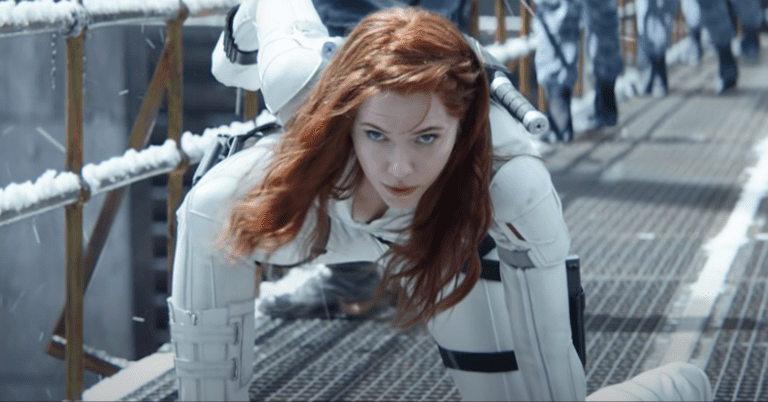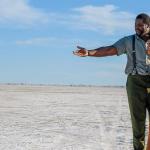
Natasha Romanoff never asked to be Black Widow. She wanted to be a butterfly; to shed her old skin and transform herself into something better, something new. Maybe that makes her a lot like us.
Almost every time we’ve seen Scarlett Johansson’s Black Widow on screen, she’s been on a quest that goes deeper than any given mission (no matter how important that mission might be). She’s looking for redemption. And in the new movie Black Widow, that ongoing quest takes center stage.
The film fills out some of Natasha Romanoff’s backstory (the three years she and a pseudo-sister were raised in Ohio by Russian spies) but it mainly takes place between Captain America: Civil War and Avengers: Infinity War. She, like several of her fellow superheroes, is on the run from authorities. So when she gets a mysterious package from her sister—one that seems to trigger an attack by a very fearsome opponent—she has time for a family reunion: First with her Ohio family, and then with Dreykov, the man responsible for the Black Widow program and turned Natasha, her sister Yelena and countless other girls into killers.
Black Widow marks a fun, thrilling return to the Marvel Cinematic Universe. Sure, Disney+’s streaming series have been really creative, but it feels like we’ve gone a long time without an actual movie. And Black Widow has always been one of the MCU’s most intriguing, most multifaceted characters. And a lot of that is because of her ongoing quest for redemption.
While her Avengers work pals have their flaws, to be sure, most of them started their stories as, if not purely good, at least good-ish. Thor was a petulant man-child who still wanted what was best for his little realm of Asgard. Iron Man was a selfish, hedonistic weapons maker, but he thought he was still doing good work. Yeah, they had their problems. But after half a film (and some backsliding in others), they saw their errors and changed their ways.
But Natasha wasn’t just flawed. She was a flat-out villain. The movies remind us of that often. Her Ohio pseudo-father—also known as The Red Guardian, the Soviet Union’s only super soldier—praises her and Yelena for their lethal pasts. “Both of you have killed so many people!” he shouts. “Your ledgers must be dripping [with blood]—just gushing! I couldn’t be more proud of you!”
But Natasha’s not proud of her past. She knows what her ledger looks like, and she feels the friction between who she was and who she is. Or (she secretly worries), who she pretends now to be. Yelena nails that friction: “I’m not the killer that little girls call their hero,” she tells Natasha. And it cuts Natasha to the quick.
Even when she turned away from Dreykov’s Widows and became a S.H.I.E.L.D. agent (S.H.I.E.L.D. was, for a time, the governmental wing under which the Avengers program was started), her role was murky. In Black Widow, we see one of the moral compromises she had to make that still haunts her. In other movies, too, she was known as the superhero who’d get her hands dirty. And when S.H.I.E.L.D. itself turned out to be compromised in Captain America: The Winter Soldier, Natasha understood how compromised she’s always been.
“I thought I knew whose lies I was telling,” Natasha tells Steve Rogers, a.k.a. Captain America. “But I guess I can’t tell the difference anymore.”
In that movie she makes a clean, painful break from the lies, downloading all of S.H.I.E.L.D.’s secrets to the Internet. And in every movie since, we see in her a nearly desperate willingness to do whatever it takes to expunge some of that blood from her ledger. And with all due respect to Tony Stark and the other heroes willing to sacrifice everything in Avengers: Endgame, I think that Natasha’s sacrifices were the movie’s most poignant.
“I’m still trying to be better,” she tells Cap in Endgame.
Aren’t we all.
I think most of us, regardless of faith, try to get better throughout our lives. At least I hope we do. But when we choose to place each of our stories into the broader, greater, Christian story, it becomes an integral, and inescapable, part of who we are. We walk alongside Natasha Romanoff, the assassin trying to be better. We make a choice to turn our back on our sins and evils and try—try—to follow a better path.
Yes, grace is part of our story; we’re given a second chance and have our own ledgers wiped clean in a way that Natasha never felt hers was. We need not regret our past, to torture ourselves over what we’ve done (or what we didn’t do): We’re forgiven, and our pasts are best forgotten.
But the biblical book of James tells us that faith, without works, is dead. When we choose that better path, we don’t just stop at the fork. We walk that better path. Every day, every hour, every minute we’re supposed to walk it—with each step coming closer to the person that God initially wanted us to be.
We can’t do it alone. The Bible makes that clear. Our salvation comes from God, not from ourselves. But when we choose to walk with God, we want to grow closer to Him. And that means doing what’s pleasing to His eyes.
You look at Black Widow’s full story arc, you see so many elements that come straight from the Christian (and especially Catholic) process of reconciliation. When she joined S.H.I.E.L.D., she was asking forgiveness for her own misdeeds. When she downloaded S.H.I.E.L.D.’s secrets in The Winter Soldier, she downloaded her own, serving as a form of public confession. And her whole career—what we see in Black Widow and beyond—marks her efforts of making restitution as best she can.
Black Widow knows she doesn’t deserve redemption. Christianity teaches us that we don’t, either. And yet, through unearned grace, we’re all given it—or, at least, a chance for it. Natasha aims to make the most of that second chance and tries, every day, to be better. That what makes her a hero—arguably the most human, and arguably the most heroic, hero in the MCU.












